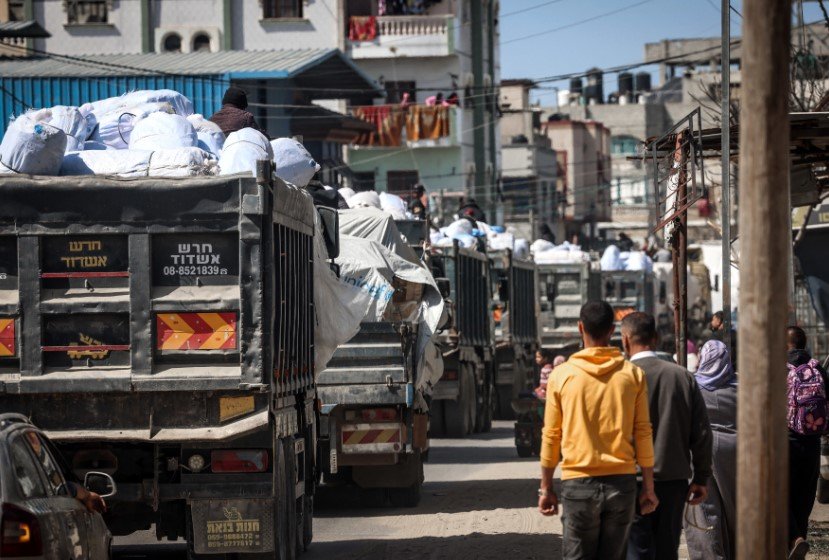As starvation claims hundreds, aid groups say a humanitarian flood is possible — if Israel chooses to allow it
In southern Gaza’s Deir al-Balah, children are dying before they can speak. Infants waste away in makeshift shelters. Mothers walk miles for bread that doesn’t exist. And the question haunting humanitarian groups, diplomats, and ordinary citizens alike is brutally simple: Could all this suffering be stopped?
The answer, according to aid experts and international observers, is also simple — yes. But it depends on one actor: Israel.
“Flood the Zone” — The Relief That’s Sitting Right There
For months now, aid trucks have been idling just across Gaza’s borders. Food, medicine, water purification tablets, even soap — all packed, ready, and within arm’s reach.
“There’s no shortage of supplies,” one aid coordinator in Amman told The Christian Science Monitor. “The world has what Gaza needs. The problem is getting it in.”
The proposed solution? “Flood the zone.” In practical terms, that means opening all available crossings, easing inspections, and allowing thousands of tons of supplies to pour in simultaneously — not in trickles, not in batches, but in waves.
The idea is simple:
-
Saturate Gaza with enough aid to meet needs immediately
-
Prevent chaos, looting, and price gouging that come with scarcity
-
Restore clean water access to prevent disease outbreaks
But while the trucks are ready, the green light isn’t.
One Border, One Gatekeeper
Israel controls most of the access points into Gaza. And despite pressure from the United Nations, Egypt, and even some U.S. lawmakers, the Israeli government has only allowed limited humanitarian corridors — and even those are shrinking.
Aid agencies say the crossings operate with unpredictable hours and extensive inspections that can take days. Some shipments — especially those with fuel or electronic components — are turned away entirely.

“There are food warehouses just 30 minutes from Rafah packed with what Gaza needs,” said a UN official who asked to remain unnamed. “But we can’t move. We’re stuck in a holding pattern.”
One short sentence captures the frustration:
“Israel could stop this famine by next week if it wanted to.”
Meanwhile in Gaza, the Clock is Ticking
By some estimates, more than 400 Palestinians — mostly children — have already died from starvation or complications linked to malnutrition since May. And the pace is accelerating.
Hospitals, overwhelmed and under-resourced, are turning away patients with severe dehydration. UNRWA clinics report that even basic antibiotics and pediatric nutrition supplements are gone.
Worse still, contaminated water is now causing outbreaks of hepatitis and cholera-like symptoms. Families are drinking from agricultural wells and cooking with untreated sewage.
Israeli Government Holds Firm — Citing Security Risks
For its part, Israel argues that opening more crossings without oversight poses a threat. Officials claim Hamas could smuggle weapons and materials under the guise of humanitarian shipments.
“There’s no doubt the people of Gaza are suffering,” an Israeli security spokesperson told The Times of Israel. “But we can’t allow aid to become a tool of terrorism.”
They point to recent discoveries of drones and weapons components hidden in shipments as justification for tight controls.
Critics argue this framing, while not baseless, misses the larger point — that civilians, not fighters, are bearing the cost.
Global Outcry Mounting, But Action Lagging
Calls to prevent famine have grown louder. The UN’s top humanitarian chief Martin Griffiths warned last week that “Gaza is on the brink of a full-blown catastrophe.” The EU and several Arab nations have urged Israel to allow wider access.
Even U.S. President Joe Biden, typically cautious in criticism of Israel, hinted at frustration during a press gaggle last Friday:
“The people of Gaza need help now. We’re working on it.”
But diplomatic appeals have yet to move the needle. And inside the Biden administration, there’s division over how forcefully to push Israel.
“Behind closed doors, we’re furious,” one U.S. diplomat told Politico. “But we’re not using the levers we actually have — aid packages, military assistance — to change behavior.”
The Moral Dilemma at the Border
The longer the famine looms, the more it transforms from a humanitarian crisis into a moral test.
Israel remains the only state with the logistical power to let mass aid through. No air drops, no naval missions, no third-party corridors can match what ground crossings could achieve in a matter of days.
So the question now facing the Israeli government is not whether it can stop the famine — it’s whether it will.
And for thousands of Gazans who go to sleep each night without food, time is running out.
